Sowing oats (and wheat and rye) in urban Troy
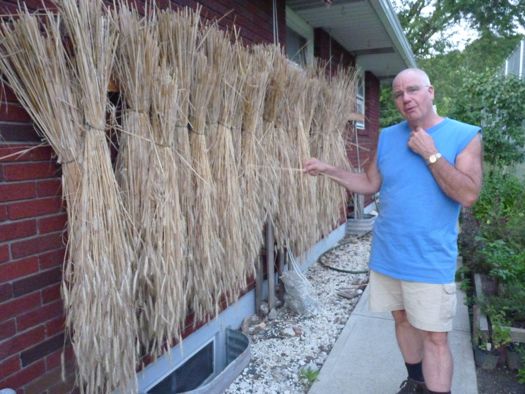
Howard Stoner sows his oats, wheat and rye on a plot of land in Troy.
Howard Stoner is ready for winter. One look at his basement and you can tell. The place is stocked with 75 pounds of potatoes and other root vegetables from his community garden and 16 pounds of rye he grew on a small plot of land in downtown Troy.
Yep. Stoner is growing his own wheat, oats and rye on a 350 square foot plot near the RPI football field.
Howard Stoner grew up on an Iowa farm. "There were three sons and none of us wanted to go into agriculture and someone bought it out and now it's part of a huge 200 acre farm." It's something he says wistfully, with a tinge of regret.
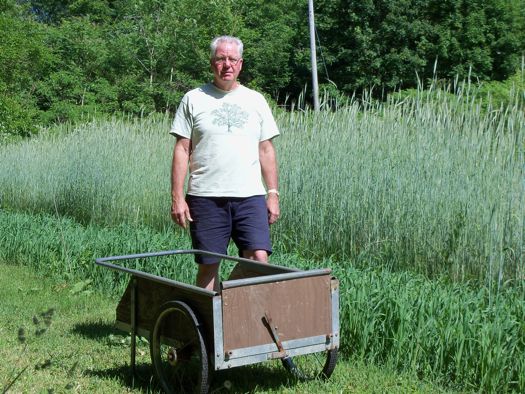
You can take the boy off the farm, but, in Stoner's case at least, you can't take farming out of the boy. After years of doing community development work in places like Zambia, where they helped grow corn, Stoner and his family settled in Troy. He became a math professor at HVCC and kept a plot at the local community garden. A few years ago he entered into a "gentleman's agreement" with a neighbor who owned an empty plot of land that was overgrown with an invasive weed. Stoner would clean up the weeds if he could use the plot for an experiment. "I wanted to try growing grains. I was curious. I was familiar with raising oats from my childhood and I wanted to see if you could raise grain and use it for breakfast cereal."
Weeds are Stoner's biggest challenge, since he doesn't use pesticides and he's working in clay-heavy soil. The first year he tried growing wheat, but that didn't work out as well as he'd hoped. Wheat only grows to about 12 to 15 inches in height -- the weeds came back and choked a lot of the crop. So the next year, Stoner tried oats, which grow from 2.5 to 3 feet tall. That worked a bit better. This year he planted rye. "Rye has proved to be my most productive crop. It grows to about 5 or 6 feet -- much taller than the weeds."
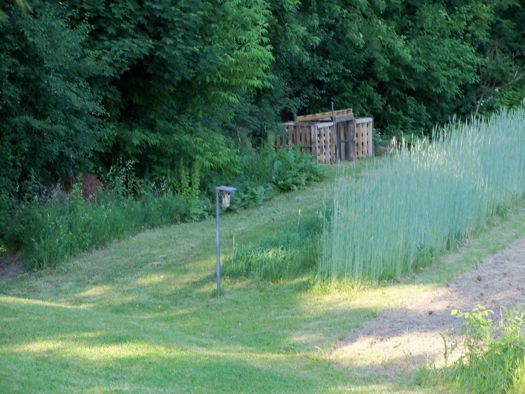
Stoner and his family mix some of the rye with oats for hot breakfast cereal and grind the rest into flour for bread. "It tastes like oatmeal. People are skeptical about rye. They think rye will have the taste of rye bread. But the rye bread taste comes mostly from the seasoning in the bread. Rye tastes kind of like oatmeal."
An investment of $2-$3 for about three pounds of seed will yield 16-20 pounds of rye. Last year Stoner invested about $6 in seeds and $3 in fuel to till the land and was able to produce 4 pounds of organic flour and 12 pounds of organic rolled rye. A $9 investment in exchange for 16 pounds of organic food sounds like a good deal for an organic enthusiast. So, yes, Stoner saves money on his breakfast cereal -- but that's not why he does it. "I wanted to do it because I was curious. Also, it's the connection to your food. In our community garden plot we have carrots and broccoli and our neighbors have an apple tree, so we use some of their apples to make applesauce that we share with them."
Stoner has an extensive vegetable garden, three pear trees, and two pecan trees. He says people are surprised to learn that it is possible to adapt farming practices to smaller areas and urban backyards with just a little bit of effort. You can start growing rye with just a 3 by 5-foot space and a set of very simple tools. To get started you will need a spade for tilling, old tire chains or a garden rake for harrowing, a hand-held grass trimmer for harvesting, a garden cart with wire mesh for threshing and lidded buckets for storage.
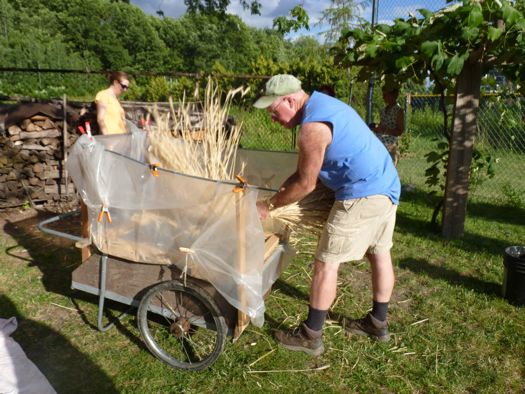
He admits that it's a lot of work. "Growing it is not that much work, but harvesting is very time consuming. I want to invest in a really good scythe, but right now I get down on my knees and take a handful of stalks and cut them."
Then he has to thresh the grains. Threshing is the process of beating the stalks of rye against a screen to loosen the kernels of grain from the stalks. After threshing, the loose chaff is blown away from the grain in a process called winnowing.
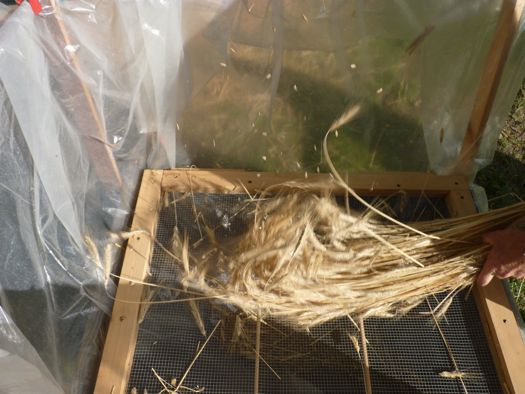
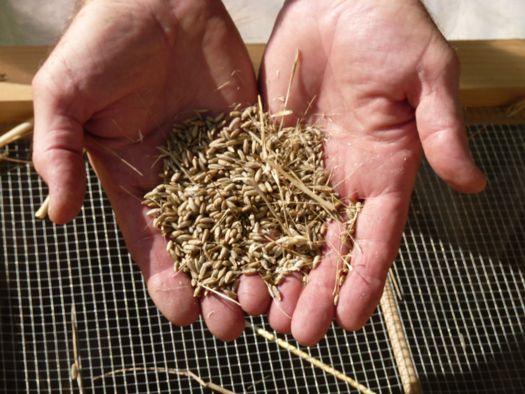
Stoner insists on doing all of the work by hand -- out of principle. Harvesting by hand is important," says Howard, "because power tools require fuel that we are running out of."
Conserving energy is important to Stoner. In addition to growing his own grains and vegetables, he's reduced his annual utility bill by 82 percent by retrofitting his 1200-square-foot 1954 home. He's re-caulked windows, installed a wood burning stove, a high energy-efficient gas boiler, and invested in a photovoltaic system, reducing his energy use by 43 percent and his fossil fuel use by 86 percent. He's now producing more energy than the household can use.
Stoner's conservation and urban farming efforts are inspired by books like James Howard Kunstler's The Long Emergency and World Made by Hand and Richard Heinberg's The Party's Over. He believes that, if adapted by enough people, these small-scale agricultural and conservation efforts help reduce our reliance on oil production and help slow the process of climate change. "As we get to peak oil prices, I think ways of doing things by hand will come back and maybe we'll come back to a lot of small farms with a lot done by hand."
Stoner encourages other folks to try raising their own grains. He's working with the Land Institute on efforts to perennialize grain crops so they'll grow back year after year.
"I don't think what we are doing now -- the large factory-style farms -- is sustainable. We need to do more small, low-impact agriculture. This is so small it may not even count -- but it's my little effort."
Close up photo of oats by Lauren DePaulo
Say Something!
We'd really like you to take part in the conversation here at All Over Albany. But we do have a few rules here. Don't worry, they're easy. The first: be kind. The second: treat everyone else with the same respect you'd like to see in return. Cool? Great, post away. Comments are moderated so it might take a little while for your comment to show up. Thanks for being patient.
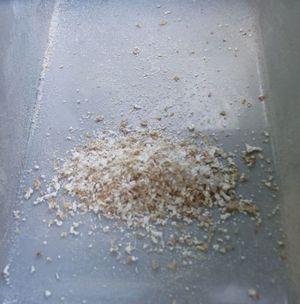
Comments
This is really cool! If nothing else, it seems like a very interesting and productive hobby.
... said M. on Oct 5, 2011 at 7:18 PM | link
Howard is an amazing guy! I'm lucky to know him.
... said Amy on Oct 5, 2011 at 8:45 PM | link
On Saturday October 22nd, Howard will be demonstrating his solar oven and root cellar skills as part of Capital District Community Gardens HomeMade Series! Email educator@cdcg.org for more information.
... said Colie on Oct 5, 2011 at 8:52 PM | link
Hey Howard, I have a scythe you can borrow.
... said Chris on Oct 6, 2011 at 8:55 AM | link
Howard (and his wife Margaret) are wonderful people totally committed to their communities striving to make a difference in resolving today's myriad challenges while creating a more durable future. They are the on-the-ground-people who get up every day to make the world a better place for the rest of us because it is the right thing to do. I've had the good fortune and privilege to know and live a few of life's adventures with them.
... said Carl McDaniel on Oct 6, 2011 at 9:29 AM | link
Howard has been one of our mentors since we had the pleasure of meeting him five years ago. Some of our most exciting times have been with Howard exploring nature, measuring trees, and identifying animal tracks. Howard is a genuine soul with a passion for life and the world around him. We love you Howard!
... said Jen & Eric on Oct 6, 2011 at 1:02 PM | link
You are an awesome brother and sister-in-law. We are proud of you. Your sister
... said Garnet VanWinkle on Oct 14, 2011 at 2:32 PM | link
Howard is a true Renaissance man; to be admired, envied, and, if you can, emulated. Be careful, however, since his level of energy and skill are unequalled. I advise taking on only one of his dozens of passions at a time and scaling it down to some small fraction of Howard's efforts.
... said John & Bonnie Snyder on Oct 15, 2011 at 8:56 AM | link
That is really interesting, Howard. Don would have loved to do something like that too. He didn't do grains, but had a huge garden and raised his own meat. Just ask one of the kids about the chickens. :) Thanks for sharing this.
... said Janet Stoner on Oct 27, 2011 at 4:42 PM | link
Howard,
I feel honored to know you and inspired by your wisdom.
... said Paula Harrison on Oct 29, 2011 at 7:20 PM | link